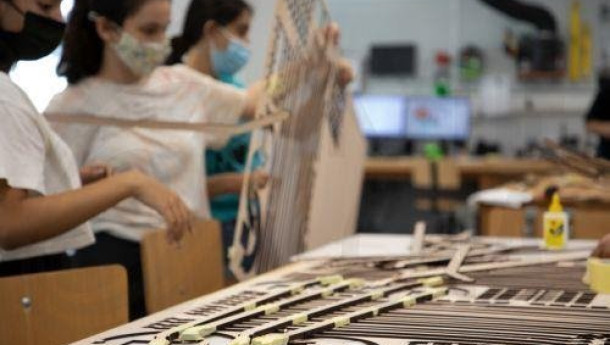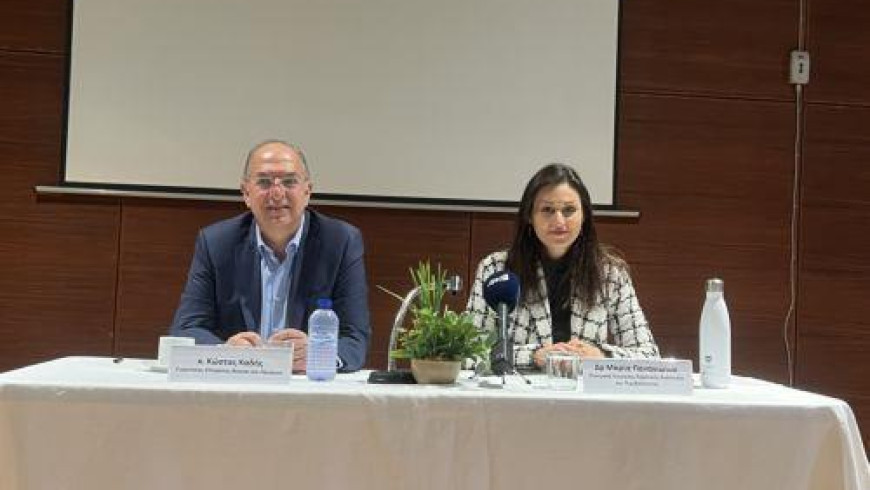
The Government's aim is for Cyprus to become a research, innovation, technology and entrepreneurship hub, Deputy Minister of Research, Innovation and Digital Policy Philippos Hadjizacharias said on Thursday, during a meeting of government stakeholders with the Centres of Excellence for Research and Innovation that took place at Nicosia Town Hall.
According to Hadjizacharias, the purpose of the meeting was to provide information on the current activities of the Cypriot Centres of Excellence Biobank.cy, CMMI, Care-C, CyENS, Eratosthenes, KIOS and Phaethon, with an emphasis on the services they can offer to policy makers, as well as the development of synergies between the Centres and public sector entities.
The state attaches particular importance to the promotion of the research and innovation sector which has enormous potential, Hadjizacharias stressed, adding that the country's Centres of Excellence have a leading role to play in this area, as they develop innovative research on issues that touch the entire spectrum of human activity, such as health, education, environment, tourism, education, health and culture.
"Cyprus can rightly be proud of a high level of research excellence. It is no coincidence that of the 38 Centres of Excellence across Europe, which secured funding through a highly competitive process, 7 are in Cyprus, an admirable success for the country," the Deputy Minister noted, adding that this success brings the country one step closer to the goal of making Cyprus a research, innovation, technology and entrepreneurship hub.
"On behalf of the State, I assure you that we have the will and determination to continue to support the Centres of Excellence through various activities, such as today's meeting, which we hope will be a springboard for the further development of mutually beneficial synergies between the Centres and a multitude of stakeholders," he added.
He also said that in addition to the €105 million government funding for the development of the seven Centres, the promotion of actions to enhance extroversion will continue, with the aim of making the most of research results for the benefit of the economy and society at large. "We are fellow travellers on the road to achieving the major goal of sustainability," he concluded.
Addressing the event, Nicosia Mayor, Constantinos Yiorkadjis, noted that Cyprus ranks first at European level in securing funding for the establishment of Research Centres of Excellence, in the framework of the "Teaming" competitive action of the Horizon 2020 Programme.
These successes, Yiorkadjis continued, reflect the high level of the academic and research community in Cyprus and have already brought significant benefits to the country, such as new competitive European funds, strengthening the business and scientific community, upgrading the country in research and innovation, promoting business innovation and creating hundreds of new jobs, adding that he considers it imperative to support the Centres after the seven-year period of the programme to safeguard the competitiveness of the Cyprus research community.
He added that the above benefits include attracting new investments and creating conditions for the repatriation of distinguished scientists, a point on which he added that he will be in London the week after next to present the work of the CyENS Centre of Excellence to scientists from the Turkish Cypriot community in the city.
These successes, apart from the country's upgrading at European level, also highlight the responsibility of the state in supporting the Centres, he added, while welcoming the total investment of some €200 to €210 million in the Centres of Excellence over seven years by the European Union and the Republic of Cyprus.
Every euro that has been invested has created multiplier effects for the economy and society of the country and especially for the cities that host these Centres, the Mayor of Nicosia continued, adding that for the Centres' sustainability it is necessary to continue the state support beyond seven years. He estimated that an investment of 15 million euros per year in the Centres per year from 2025 to 2035 would be a reasonable figure, which would not only allow them to continue their valuable work, but also to consolidate and safeguard existing jobs. "These Centres will support the creation of a modern, sustainable and flexible state, diversifying Cyprus' economic model," he said.
Regarding the Centres’ sustainability, Yiorkadjis also highlighted the need to create tax incentives for individuals and/or companies to invest in research and innovation, as well as the creation of regulations that allow university professors to create companies in cooperation with individuals with easy procedures to promote innovation with the participation of the private sector.
"Science and research, like innovation, is a matter for all Cypriots," he said, adding that in this context he will attend on Thursday afternoon, together with the so called "mayor" of Turkish occupied Nicosia, Mehmet Harmanci, the beginning of an effort to create an ecosystem in the occupied territories and to strengthen relations between members of the scientific community in Cyprus.
Deputy Ministry Permanent Secretary Stelios Himonas said in his address that the Centres of Excellence have an obligation within the seven years of state funding to be established, start operating and become viable, adding that the Deputy Ministry wants to support the effort of the Centres of Excellence, which, he noted, as subsidised organisations have a restriction under the state aid framework not to develop commercial activities beyond 20% of their total activities.
He added that the Centres of Excellence according to an opinion of the Public Procurement Directorate are contracting authorities, i.e. government agencies can enter into contract directly without a bidding process with the Centres of Excellence for various services they need.
Himonas also said that the Centres of Excellence have dozens of highly qualified scientists and accumulated knowledge of a very high level, which covers the scope of activities of all ministries (space, sea, multimedia, climate change, energy, health, atmosphere) and which can be exploited and used by government agencies.
The event continued with the presentation of the work and activities of the Centres of Excellence, as well as the services they can offer.














 3287.99
3287.99 1275.09
1275.09
